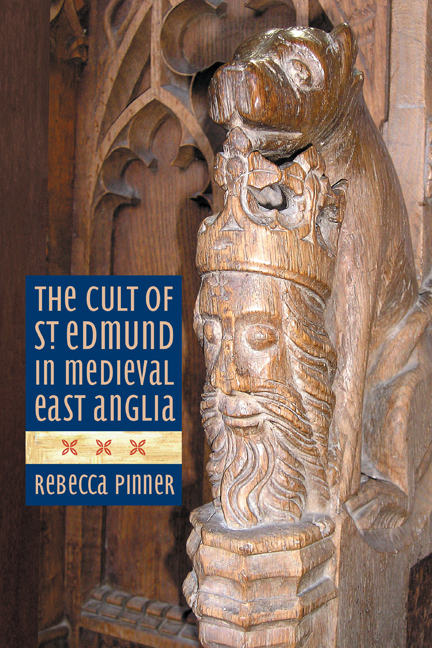Book contents
- Frontmatter
- Contents
- List of Illustrations
- Acknowledgements
- Abbreviations
- Introduction
- Part I Texts and Contexts: the Legend of St Edmund
- Part II Relics, Shrines and Pilgrimage: Encountering St Edmund at Bury
- Part III Beyond Bury: Dissemination and Appropriation
- Conclusion: ‘Martir, Mayde and Kynge’, and More
- Appendix 1 Synoptic Account of the Legend of St Edmund
- Appendix 2 Chronology of Significant Events and Texts Associated with the Cult of St Edmund
- Bibliography
- Index
Appendix 1 - Synoptic Account of the Legend of St Edmund
Published online by Cambridge University Press: 21 May 2021
- Frontmatter
- Contents
- List of Illustrations
- Acknowledgements
- Abbreviations
- Introduction
- Part I Texts and Contexts: the Legend of St Edmund
- Part II Relics, Shrines and Pilgrimage: Encountering St Edmund at Bury
- Part III Beyond Bury: Dissemination and Appropriation
- Conclusion: ‘Martir, Mayde and Kynge’, and More
- Appendix 1 Synoptic Account of the Legend of St Edmund
- Appendix 2 Chronology of Significant Events and Texts Associated with the Cult of St Edmund
- Bibliography
- Index
Summary
EDMUND was born of ‘the stock of the Old Saxons’, the son of King Alkmund and Queen Siware. He was a prudent and holy child, fulfilling the potential miraculously foretold to his father by a wise woman in Rome before the young prince's birth.
On his way to the Holy Land on pilgrimage, Edmund's uncle Offa, king of East Anglia, visited his relatives. He was so struck by Edmund's virtues that he named him his heir. On his return from Jerusalem, Offa fell ill and died. His attendants travelled to the court of King Alkmund and presented Offa's ring to the young prince as a sign of his inheritance. Reluctantly, Edmund's parents agreed that he must leave, and with many tears they bade him farewell.
On his arrival in East Anglia, at ‘Maydensburgh’, Edmund knelt and gave thanks for a successful sea crossing. Five miraculous wells sprang forth and thereafter watered the land, bringing great fertility to the area. Edmund founded the town of Hunstanton, which was built nearby.
The new king travelled south across his kingdom to Attleborough, where he spent a year learning his Psalter. At the end of the year he was proclaimed king by public acclamation, and was crowned at the royal seat at Bures. He ruled wisely, administering justice, defending the Church, and offering charity to widows and orphans. He was also a valiant knight, hunting and hawking with his men.
Meanwhile, tales of the East Anglian king reached the Danish court. King Lothbroc taunted his sons, Hinguar and Hubba, claiming that they measured badly against the merits of the foreign ruler. Whilst he was out alone, fishing, Lothbroc's boat was swept away from the Danish shore and carried across the North Sea. Beaching on the East Anglian coast, he was hospitably received by King Edmund, and the two spent many hours together, hunting and talking. However, one of Edmund's huntsman, Bern, was jealous, and lured Lothbroc to the forest, where he killed him. Lothbroc's faithful greyhound returned to court and led Edmund to the body. Bern was cast adrift in a boat without oars and washed ashore on the Danish coast. Unable to admit his own part in their father's murder, Bern told Hinguar and Hubba that Edmund had ordered his death. Enraged, and still rankling from their father's taunts, the Danes set sail for East Anglia.
- Type
- Chapter
- Information
- The Cult of St Edmund in Medieval East Anglia , pp. 246 - 247Publisher: Boydell & BrewerPrint publication year: 2015



